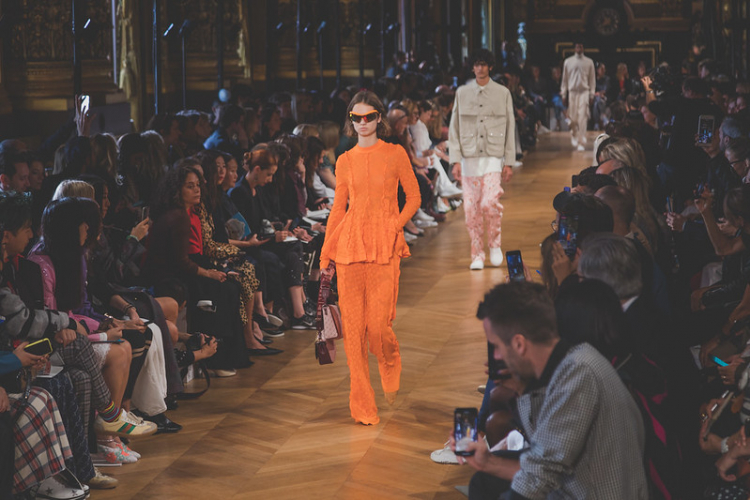Paris Fashion Week Talks the Talk Without Walking the Walk

Bella Hadid drew global attention when a Coperni dress was quite literally sprayed onto her body on the first Friday evening of Paris Fashion Week. Sebastian Meyer, Coperni’s co-founder said, “it’s our duty as designers to try new things and show a possible future.” Days before, Balmain and Evian water collaborated and unveiled their newest sustainable innovation at PFW, a recycled dress worn by French influencer, Lena Situations. This year demonstrates incredible technological advancements in the fashion industry. However, has Paris Fashion Week become tone-deaf?
In 2021, the Fédération de la Haute Couture et de la Mode partnered with PricewaterhouseCoopers (PWC) “to develop two new tools to measure the environmental, social and economic impacts of its many runway shows.” This was an incredible step in identifying where Paris Fashion Week can improve for future shows. Last year, Vogue said that “Paris Fashion Week intends to lead the charge to better understand the environmental impact of fashion shows.” It should be noted that the results of an individual brand’s audit would not be made public, and it appears as though there has been little to no follow-up on the findings of PWC’s sustainability audit on Paris Fashion Week as a whole. Could this be because the findings were so bad? Or perhaps it's because little to no improvements have really been made.
As we become more educated about the climate crisis and sustainability, we also become more aware of the unfortunate reality of greenwashing. Greenwashing refers to a company marketing itself as sustainable while not attempting to make genuine sustainable efforts. This has almost become standard practice for big brands like H&M which has recently been sued for engaging in false advertising about the sustainability of their clothing, and Boohoo, who has been accused of shameless greenwashing with their recent “sustainable” line with Kourtney Kardashian. However, do the origins of greenwashing in fashion start on the runway?
Paris Fashion Week's origins date back long before the prêt-à-porter (ready-to-wear) era, in a time before the fashion industry developed into the unstoppable freight train it has become today. Now, the fashion industry has become one of the most polluting in the world and is responsible for the unethical and inhumane working conditions of millions of workers in the textile industry. Believe it or not, fashion produces one-fifth of the 300 million tons of plastic produced globally each year.
Yet, Paris Fashion Week continues to showcase close to 100 different designers, many of whom uphold unsustainable and unethical practices. Envisioning a future that is not for the people or the planet is however perhaps tone-deaf.
Despite PWC’s 2021 sustainability audit, any discussion or follow-up cannot easily be found. Is this because no positive changes have been made? This year, I have friends flying in from all over the world just to be in the city during the infamous fashion week. I’ve overheard students on campus mentioning all the celebrities they have seen lately, including a few of the Kardashians. There are so many people flying into Paris, buying outfits for fashion week and contributing to one of the most damaging industries in the world. Yet, PFW has not seemed to acknowledge this problematic reality.
Nafiseh Soolari is an AUP Global Communications student on the Fashion track who has experience working behind the scenes at Paris Fashion Week. She expressed how sustainability is “very much a marketing aspect for most brands” but appreciates designers like Ronald van der Kemp (RVDK) who is “very transparent in conveying the idea of slow fashion.”
Sarah Bailey, another Global Communications student on the Fashion Track, also shared photos of Anrealage’s collection, showcasing his handmade patchwork textiles. Anrealage says sustainability is the source of his creation, and we see this idea echoed through the beliefs of other designers like Stella McCartney. However, there are dozens of other designers at PFW who do not uphold such values.
This further begs the question of whether Fashion Week, in Paris and across the world, can ever claim to be a sustainable event. In 2019, the Swedish Fashion Council cancelled Stockholm Fashion Week and wanted “to raise awareness even more about these annual events, which are too often idealized, and whose only magic cannot entirely erase the true consistency of the event: fleeting shows of about ten minutes with a high carbon footprint (passenger transport, increasing energy expenditure, grandiose scenery, waste production…).” Without external accountability, it is tempting to believe that the PWC audit revealed events so catastrophic they couldn’t be made public.
Extinction Rebellion crashed the runway at Paris Fashion Week - https://t.co/5ioMhgO1Bw pic.twitter.com/7XhOpsU2ip
— Nuevo Culture (@nuevoculture) October 11, 2021
Perhaps this notion of more sustainable and slow fashion has not been fully embraced on the runway yet. I believe Paris Fashion Week is not the leader in sustainability, and should never claim that fashion week and sustainability can go hand in hand. How could it possibly claim to be sustainable when Evian (bottled water, come on…) collaborates with designers and the Kardashians take their private jets to attend the shows?
An article by Henrietta McFarlane says, "without clear plans to implement rules or policies as a result of these [sustainability] measurements, what effect the tools really have in reducing the impact of Paris Fashion Week remains to be seen." To market this capitalistic event as sustainable or leading the way is plain and simple greenwashing.







